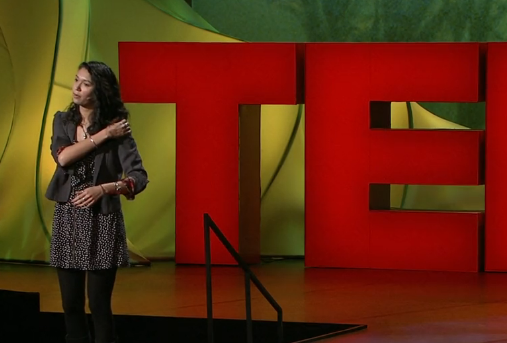When I was a freshman in high school, I was a live wire of nervous hormones. And I was underdeveloped and over-excitable.
當(dāng)我是高一新生時(shí),我是一個(gè)神經(jīng)激素異常活躍的人。我發(fā)育不良,但又過(guò)度興奮。
And despite my fear of ever being looked at for too long, I was fascinated by the idea of spoken-word poetry.
盡管我向來(lái)害怕 被人瞧太久,我卻對(duì)口語(yǔ)詩(shī)歌的想法著迷。
I felt that my two secret loves, poetry and theater, had come together, had a baby, a baby I needed to get to know.
我感到我2個(gè)秘密的愛(ài)好,詩(shī)歌和戲劇可以結(jié)合為一體,有了新生兒,我得去了解這新藝術(shù)。
So I decided to give it a try. My first spoken-word poem, packed with all the wisdom of a 14-year-old, was about the injustice of being seen as unfeminine.
所以我決定試一下。我第一首口語(yǔ)詩(shī),集成我14歲時(shí)的所有智慧,它是有關(guān)被視為無(wú)女人味的侵權(quán)問(wèn)題。
The poem was very indignant, and mainly exaggerated, but the only spoken-word poetry that I had seen up until that point was mainly indignant, so I thought that's what was expected of me.
這詩(shī)是非常氣憤的,大部分夸張了,但除了這一點(diǎn)外,我看這口語(yǔ)詩(shī)主要是義憤填膺的風(fēng)格,我想這就是我所期望的效果。
The first time that I performed, the audience of teenagers hooted and hollered their sympathy, and when I came off the stage, I was shaking.
我第一次表演,年輕觀眾們歡呼雀躍以示同情,但我走下舞臺(tái)我在發(fā)抖。

I felt this tap on my shoulder, and I turned around to see this giant girl in a hoodie sweatshirt emerge from the crowd.
有人在我肩膀上輕拍了一下,我轉(zhuǎn)身看到這個(gè)從觀眾群中脫身而出穿著連帽運(yùn)動(dòng)衫的高大女孩。
She was maybe eight feet tall and looked like she could beat me up with one hand, but instead she just nodded at me and said, "Hey, I really felt that. Thanks."
她或許有8英尺高,好像她要一拳把我擊倒在地,與此相反她對(duì)我只是點(diǎn)點(diǎn)頭,說(shuō)到,“嗨,我的確和你同感。
And lightning struck. I was hooked.
謝謝。” 頓時(shí)像雷擊一樣。我被吸引住了。
I discovered this bar on Manhattan's Lower East Side that hosted a weekly poetry open Mic,
我發(fā)現(xiàn)曼哈頓下東區(qū)的這個(gè)酒吧它主持每周公眾詩(shī)歌朗讀表演,
and my bewildered, but supportive, parents took me to soak in every ounce of spoken word that I could.
我那困惑,但又支持我的父母帶我完全沉浸在這口語(yǔ)詩(shī)表演中。
I was the youngest by at least a decade, but somehow the poets at the Bowery Poetry Club didn't seem bothered by the 14-year-old wandering about. In fact, they welcomed me.
至少在10年里我是最年輕的詩(shī)人,不知怎的,鮑威利詩(shī)社的詩(shī)人并不介意14歲的我在此流連忘返--事實(shí)上,他們歡迎我的加入。
And it was here, listening to these poets share their stories, that I learned that spoken-word poetry didn't have to be indignant, it could be fun or painful or serious or silly.
就是在這兒,聽(tīng)著這些詩(shī)歌,分享著他們的故事,從中我了解到口語(yǔ)詩(shī)不是要義憤填膺的風(fēng)格,它可能是有趣的,痛苦的,嚴(yán)肅的或者無(wú)聊的詩(shī)。
The Bowery Poetry Club became my classroom and my home, and the poets who performed encouraged me to share my stories as well.
鮑威利詩(shī)社變成了我的課堂和我家。表演的詩(shī)人也鼓勵(lì)我去分享我的故事。
Never mind the fact that I was 14. They told me, "Write about being 14."
從不介意我只是14歲--他們告訴我,“要14歲那樣的寫(xiě)詩(shī)。”
So I did and stood amazed every week when these brilliant, grown-up poets laughed with me and groaned their sympathy and clapped and told me, "Hey, I really felt that too."
每周我那樣寫(xiě)詩(shī),驚奇地站著表演,這些聰明的成年詩(shī)人和我一起笑,表達(dá)著他們的關(guān)心,同時(shí)鼓掌告訴我,“嗨,我也和你同感。”



